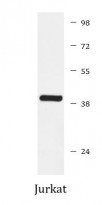ARG40660
anti-SIRT6 antibody
anti-SIRT6 antibody for Western blot and Human
Overview
| Product Description | Rabbit Polyclonal antibody recognizes SIRT6 |
|---|---|
| Tested Reactivity | Hu |
| Tested Application | WB |
| Host | Rabbit |
| Clonality | Polyclonal |
| Isotype | IgG |
| Target Name | SIRT6 |
| Antigen Species | Human |
| Immunogen | Synthetic peptide derived from Human SIRT6. |
| Conjugation | Un-conjugated |
| Alternate Names | SIR2L6; NAD-dependent protein deacetylase sirtuin-6; SIR2-like protein 6; Regulatory protein SIR2 homolog 6; EC 3.5.1.- |
Application Instructions
| Application Suggestion |
|
||||
|---|---|---|---|---|---|
| Application Note | * The dilutions indicate recommended starting dilutions and the optimal dilutions or concentrations should be determined by the scientist. |
Properties
| Form | Liquid |
|---|---|
| Purification | Affinity purified. |
| Buffer | PBS (pH 7.4), 150 mM NaCl, 0.02% Sodium azide and 50% Glycerol. |
| Preservative | 0.02% Sodium azide |
| Stabilizer | 50% Glycerol |
| Storage Instruction | For continuous use, store undiluted antibody at 2-8°C for up to a week. For long-term storage, aliquot and store at -20°C. Storage in frost free freezers is not recommended. Avoid repeated freeze/thaw cycles. Suggest spin the vial prior to opening. The antibody solution should be gently mixed before use. |
| Note | For laboratory research only, not for drug, diagnostic or other use. |
Bioinformation
| Database Links |
Swiss-port # Q8N6T7 Human NAD-dependent protein deacetylase sirtuin-6 |
|---|---|
| Gene Symbol | SIRT6 |
| Gene Full Name | sirtuin 6 |
| Background | This gene encodes a member of the sirtuin family of proteins, homologs to the yeast Sir2 protein. Members of the sirtuin family are characterized by a sirtuin core domain and grouped into four classes. The functions of human sirtuins have not yet been determined; however, yeast sirtuin proteins are known to regulate epigenetic gene silencing and suppress recombination of rDNA. Studies suggest that the human sirtuins may function as intracellular regulatory proteins with mono-ADP-ribosyltransferase activity. The protein encoded by this gene is included in class IV of the sirtuin family. Alternative splicing results in multiple transcript variants.[provided by RefSeq, Jul 2010] |
| Function | NAD-dependent protein deacetylase. Has deacetylase activity towards histone H3K9Ac and H3K56Ac. Modulates acetylation of histone H3 in telomeric chromatin during the S-phase of the cell cycle. Deacetylates histone H3K9Ac at NF-kappa-B target promoters and may down-regulate the expression of a subset of NF-kappa-B target genes. Acts as a corepressor of the transcription factor HIF1A to control the expression of multiple glycolytic genes to regulate glucose homeostasis. Required for genomic stability. Regulates the production of TNF protein. Has a role in the regulation of life span (By similarity). Deacetylation of nucleosomes interferes with RELA binding to target DNA. May be required for the association of WRN with telomeres during S-phase and for normal telomere maintenance. Required for genomic stability. Required for normal IGF1 serum levels and normal glucose homeostasis. Modulates cellular senescence and apoptosis. On DNA damage, promotes DNA end resection via deacetylation of RBBP8. Has very weak deacetylase activity and can bind NAD(+) in the absence of acetylated substrate. [UniProt] |
| Cellular Localization | Nucleus, nucleoplasm. Note=Predominantly nuclear. Associated with telomeric heterochromatin regions. [UniProt] |
| Calculated MW | 39 kDa |
Images (1) Click the Picture to Zoom In






